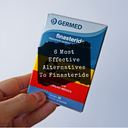Derma rolling, also known as microneedling, has gained popularity in recent years as a minimally invasive treatment for various skin concerns, including acne scars, fine lines, and wrinkles. However, before you start using a derma roller, it's essential to determine whether it's suitable for you or not. In this article, we'll answer the question "Who should not use derma roller?" and provide you with valuable insights to help you make an informed decision.
Table of content
Who Should Not Use Derma Roller?
While derma rolling can be an effective treatment for many people, there are certain individuals who should avoid using it or use it with caution. These include:
Pregnant or Breastfeeding Women
Pregnant or breastfeeding women should avoid using derma rollers due to the risk of infection and the potential for the needles to cause harm to the developing fetus or baby. Additionally, the hormonal changes during pregnancy and breastfeeding can cause skin sensitivity, making it more challenging to use a derma roller safely.
People with Active Skin Conditions
If you have an active skin condition such as acne, rosacea, eczema, or psoriasis, it's best to avoid using a derma roller until your condition is under control. Derma rolling can exacerbate these conditions, leading to further inflammation and irritation. It's essential to treat your skin condition first and then consider using a derma roller once your skin is stable.
Individuals with Open Wounds or Cuts
If you have open wounds or cuts on your skin, it's crucial to avoid using a derma roller until they have fully healed. Derma rolling can introduce bacteria into the wound, leading to infection and delayed healing. It's essential to allow your skin to heal naturally before using a derma roller.
People with Skin Cancer or Precancerous Lesions
If you have a history of skin cancer or precancerous lesions, it's best to consult with a dermatologist before using a derma roller. Derma rolling can cause micro-tearing of the skin, which may lead to the spread of cancer cells or the development of new lesions.
Individuals with Sensitive Skin
If you have sensitive skin, you may want to exercise caution when using a derma roller. Derma rolling can cause irritation, redness, and itching, especially if you have sensitive skin. Start with a low-needle density and gradually increase as your skin becomes more tolerant.
People with Skin Infections
If you have a skin infection such as folliculitis, cellulitis, or impetigo, it's essential to treat the infection before using a derma roller. Derma rolling can spread the infection and make it more challenging to treat.
Individuals with Skin Scars or Keloids
If you have skin scars or keloids, it's best to consult with a dermatologist before using a derma roller. Derma rolling can cause further irritation and inflammation, which may lead to the formation of new scars or keloids.
People with Skin Pigmentation Issues
If you have skin pigmentation issues such as melasma, hyperpigmentation, or hypopigmentation, it's essential to consult with a dermatologist before using a derma roller. Derma rolling can cause further irritation and inflammation, which may lead to the worsening of skin pigmentation issues.
Individuals with Skin Allergies
If you have skin allergies, it's best to patch test a derma roller on a small area of your skin before using it on your face or body. This will help you determine if you have any sensitivity or allergic reactions to the device or the needles.
People with Skin Conditions that Affect Skin Elasticity
If you have skin conditions that affect skin elasticity, such as scleroderma or Ehlers-Danlos syndrome, it's essential to consult with a dermatologist before using a derma roller. Derma rolling can cause further damage to the skin, leading to a loss of elasticity and skin laxity.
Individuals with Skin Conditions that Affect Skin Thickness
If you have skin conditions that affect skin thickness, such as atopic dermatitis or ichthyosis, it's best to consult with a dermatologist before using a derma roller. Derma rolling can cause further irritation and inflammation, which may lead to the worsening of skin thickness issues.
People with Skin Conditions that Affect Skin Barrier Function
If you have skin conditions that affect skin barrier function, such as eczema or psoriasis, it's essential to consult with a dermatologist before using a derma roller. Derma rolling can cause further irritation and inflammation, which may lead to the worsening of skin barrier function issues.
Individuals with Skin Conditions that Affect Skin pH
If you have skin conditions that affect skin pH, such as acne or rosacea, it's best to consult with a dermatologist before using a derma roller. Derma rolling can cause further irritation and inflammation, which may lead to the worsening of skin pH issues.
People with Skin Conditions that Affect Skin Moisture
If you have skin conditions that affect skin moisture, such as dry skin or eczema, it's essential to consult with a dermatologist before using a derma roller. Derma rolling can cause further irritation and inflammation, which may lead to the worsening of skin moisture issues.
Individuals with Skin Conditions that Affect Skin Sensitivity
If you have skin conditions that affect skin sensitivity, such as rosacea or eczema, it's best to consult with a dermatologist before using a derma roller. Derma rolling can cause further irritation and inflammation, which may lead to the worsening of skin sensitivity issues.
People with Skin Conditions that Affect Skin Texture
If you have skin conditions that affect skin texture, such as acne or rosacea, it's essential to consult with a dermatologist before using a derma roller. Derma rolling can cause further irritation and inflammation, which may lead to the worsening of skin texture issues.
Individuals with Skin Conditions that Affect Skin Tone
If you have skin conditions that affect skin tone, such as melasma or hyperpigmentation, it's best to consult with a dermatologist before using a derma roller. Derma rolling can cause further irritation and inflammation, which may lead to the worsening of skin tone issues.
People with Skin Conditions that Affect Skin Elasticity and Skin Thickness
If you have skin conditions that affect both skin elasticity and skin thickness, such as scleroderma or Ehlers-Danlos syndrome, it's essential to consult with a dermatologist before using a derma roller. Derma rolling can cause further damage to the skin, leading to a loss of elasticity and skin laxity.
Individuals with Skin Conditions that Affect Skin pH and Skin Moisture
If you have skin conditions that affect both skin pH and skin moisture, such as acne or rosacea, it's best to consult with a dermatologist before using a derma roller. Derma rolling can cause further irritation and inflammation, which may lead to the worsening of skin pH and skin moisture issues.
People with Skin Conditions that Affect Skin Sensitivity and Skin Texture
If you have skin conditions that affect both skin sensitivity and skin texture, such as rosacea or eczema, it's essential to consult with a dermatologist before using a derma roller. Derma rolling can cause further irritation and inflammation, which may lead to the worsening of skin sensitivity and skin texture issues.
Individuals with Skin Conditions that Affect Skin Tone and Skin Elasticity
If you have skin conditions that affect both skin tone and skin elasticity, such as melasma or hyperpigmentation, it's best to consult with a dermatologist before using a derma roller. Derma rolling can cause further irritation and inflammation, which may lead to the worsening of skin tone and skin elasticity issues.
People with Skin Conditions that Affect Skin pH, Skin Moisture, and Skin Sensitivity
If you have skin conditions that affect all three skin parameters (pH, moisture, and sensitivity), such as acne or rosacea, it's essential to consult with a dermatologist before using a derma roller. Derma rolling can cause further irritation and inflammation, which may lead to the worsening of skin pH, skin moisture, and skin sensitivity issues.
Individuals with Skin Conditions that Affect Skin Texture, Skin Tone, and Skin Elasticity
If you have skin conditions that affect all three skin parameters (texture, tone, and elasticity), such as melasma or hyperpigmentation, it's best to consult with a dermatologist before using a derma roller. Derma rolling can cause further irritation and inflammation, which may lead to the worsening of skin texture, skin tone, and skin elasticity issues.
People with Skin Conditions that Affect Skin pH, Skin Moisture, Skin Sensitivity, and Skin Texture
If you have skin conditions that affect all four skin parameters (pH, moisture, sensitivity, and texture), such as acne or rosacea, it's essential to consult with a dermatologist before using a derma roller. Derma rolling can cause further irritation and inflammation, which may lead to the worsening of skin pH, skin moisture, skin sensitivity, and skin texture issues.
Individuals with Skin Conditions that Affect Skin Tone, Skin Elasticity, Skin pH, and Skin Moisture
If you have skin conditions that affect all four skin parameters (tone, elasticity, pH, and moisture), such as melasma or hyperpigmentation, it's best to consult with a dermatologist before using a derma roller. Derma rolling can cause further irritation and inflammation, which may lead to the worsening of skin tone, skin elasticity, skin pH, and skin moisture issues.
People with Skin Conditions that Affect Skin pH, Skin Moisture, Skin Sensitivity, Skin Texture, and Skin Tone
If you have skin conditions that affect all five skin parameters (pH, moisture, sensitivity, texture, and tone), such as acne or rosacea, it's essential to consult with a dermatologist before using a derma roller. Derma rolling can cause further irritation and inflammation, which may lead to the worsening of skin pH, skin moisture, skin sensitivity, skin texture, and skin tone issues.
Individuals with Skin Conditions that Affect Skin Elasticity, Skin pH, Skin Moisture, Skin Sensitivity, and Skin Texture
If you have skin conditions that affect all five skin parameters (elasticity, pH, moisture, sensitivity, and texture), such as melasma or hyperpigmentation, it's best to consult with a dermatologist before using a derma roller. Derma rolling can cause further irritation and inflammation, which may lead to the worsening of skin elasticity, skin pH, skin moisture, skin sensitivity, and skin texture issues.
People with Skin Conditions that Affect Skin pH, Skin Moisture, Skin Sensitivity, Skin Texture, Skin Tone, and Skin Elasticity
If you have skin conditions that affect all six skin parameters (pH, moisture, sensitivity, texture, tone, and elasticity), such as acne or rosacea, it's essential to consult with a dermatologist before using a derma roller. Derma rolling can cause further irritation and inflammation, which may lead to the worsening of skin pH, skin moisture, skin sensitivity, skin texture, skin tone, and skin elasticity issues.
Conclusion
In conclusion, while derma rolling can be an effective treatment for many people, it's essential to determine whether it's suitable for you or not. If you have any of the skin conditions mentioned above, it's best to consult with a dermatologist before using a derma roller. Remember to always prioritize your skin health and safety when using any new skincare treatment.
References:
1. American Academy of Dermatology. (2020). Microneedling.
2. National Institute of Arthritis and Musculoskeletal and Skin Diseases. (2020). Skin Conditions.
3. Journal of Clinical and Aesthetic Dermatology. (2019). Microneedling: A Review of the Literature.
4. Journal of Investigative Dermatology. (2018). Microneedling: A Novel Approach to Skin Rejuvenation.
5. Dermatologic Surgery. (2017). Microneedling: A Review of the Literature.
6. Journal of Cosmetic Dermatology. (2016). Microneedling: A Review of the Literature.
Tired of thinning hair holding you back?
Fight back with the medical-grade Scandinavian Biolabs Scalp Activation Derma Roller.
This isn't just any derma roller - it's packed with 540 medical-grade titanium needles designed to awaken dormant hair follicles and trigger thicker, healthier hair growth.
Imagine: a fuller head of hair you can be confident about.
And the best part? It's easy to use. Just roll it gently over your scalp once a week, even on wet hair. It's painless and works with your existing routine.
Don't waste another day with lifeless hair. Invest in your confidence with the Scalp Activation Derma Roller. Get yours today and watch your hair transform!

Read more:
- Dermatologist's Guide To The Best Derma Roller For Hair Growth
- 11 Best Shampoos For Thinning Hair Due To Menopause & Itchy Scalp
- 19 Best & Proven Shampoos For Hair Thinning In 2024
As your leading source for hair health information over the past 4 years, we never compromise on accuracy. When it comes to your health, you deserve information you can truly rely on - and earning your trust is our top priority.
Here's how Scandinavian Biolabs ensures every piece of content meets the highest standards of accuracy and integrity:
- Credentialed Experts: Our reviewers are actively practicing doctors and medical researchers
- Stringent Reviews: Content undergoes rigorous editing by subject specialists and review by a practicing doctor.
- Evidence-Based: We rely on well-established research from trusted scientific sources like peer-reviewed journals and health authorities.
- Full Transparency: Our editorial standards, writer credentials, reviewer credentials, correction process, and funding are all publicly documented.
- Independent Voice: While we do promote products, we operate in a vacuum to business operations. Our main goal is just an unwavering commitment to providing medically-sound guidance.
You can count on Scandinavian Biolabs to consistently deliver the trustworthy health information you deserve. Read our Editorial Standards.






